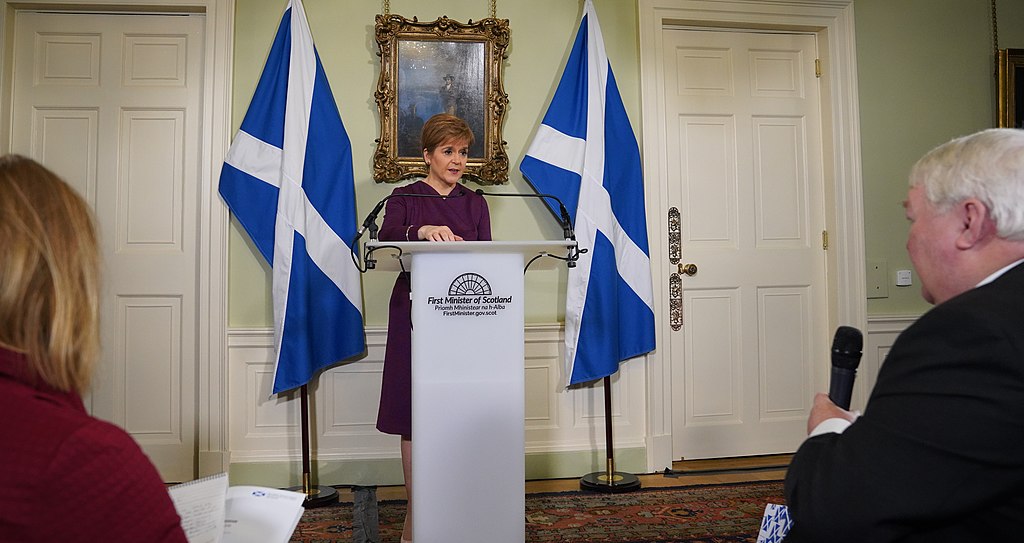Having failed to achieve an overall SNP majority in the recent Scottish Parliament election, Nicola Sturgeon was forced to postpone her political manoeuvrings for a second independence referendum which now routinely follows every election her party contests. However, the finalisation of a cooperation agreement with the pro-independence Scottish Greens has brought this grace period to an end and plunged us back into the constitutional turmoil which perpetually plagues Scottish politics.
Any hopes that independence would take a back seat until Scotland had recovered from the pandemic, as promised by the SNP in May, were dashed upon the release of the “shared policy programme” that accompanied the new quasi-coalition. The first pledge of this document was to “secure a referendum on Scottish independence” within the first two years of the new parliament. This was predictably followed by the First Minister’s proclamation that she now had an “undeniable” mandate for a second referendum, and the announcement that civil servants were to start working on a new case for independence.
The SNP face a major issue in attempting to translate the pro-independence majority in the Scottish parliament to a mandate for another referendum. Notably, the party did not campaign on a clear pro-referendum platform during the election.
Instead, sensibly, they chose to focus on Nicola Sturgeon’s pandemic leadership and the recovery that was to come, with the independence question taking a backseat. This was shown clearly in the final debate of the campaign when Glenn Campbell pushed the first minister, saying “they don’t want another independence referendum during the period of the recovery, so what are they meant to do? If they want you as First Minister but don’t want independence?” Nicola Sturgeon replied clearly “they should vote for me.”
It is not that SNP voters were unaware of the party’s support for independence in May, to claim that would be absurd. However there is a clear disparity between the set of priorities used to bait voters during the election campaign and the set of priorities the SNP have switched to in power. Not only does this dishonesty destroy the argument for a second referendum, it also undermines Scottish democracy.
This is understood by the electorate. Recent polling that shows only 12% of Scots think independence is amongst the countries most important issues, with the COVID recovery, NHS, economy and jobs all ranked as more important. Another poll shows that only 38% of Scottish people believe there should be another referendum within the First Minister’s timescale of 2 years, with 52% opposed to this plan.
During the May election Nicola Sturgeon also rubbished Alex Salmond’s idea for an “independence supermajority”, labelling it as an attempt to “game the system” for his new Alba party. In this assertion the First Minister was, for once, correct. Using parties that do not seriously contest the constituency votes to achieve a majority cannot seriously be taken as popular support for independence.
Since then the First Minister seems to have had a rapid change of heart on the issue. She now argues that the Greens’ support gives her a clear mandate for a second referendum despite the fact that only 68% of those likely to vote Green on the list in May supported independence. Both parties using these unscrupulous political tactics underscores the notion that they have no interest in representing the will of the Scottish people, only twisting it to fit their agenda.
This distortion of Scotland’s political will continues when we compare how votes cast converted to seats won at the last election. The Scottish Government pushes their parliamentary majority into the spotlight at every opportunity. What they prefer to hide is that even when combined their parties only received 49% and 48.4% of votes on the constituency and regional ballots respectively. No serious democrat can demand another referendum when it was Scotland’s electoral system, not the Scottish people, which delivered this government’s majority.
With all of these factors considered, and the polls showing a clear majority for remaining in the UK, it is hard to see the Scottish government’s second referendum push as anything but desperate, cynical and ideologically driven. Despite this, the major UK political parties have failed to offer a serious critique of this nationalist narrative. In pushing back, supporters of the Union must not hide behind the “once in a generation” comfort blanket argument. Instead it must be clearly detailed to voters why Scotland has not given a democratic mandate for another referendum, and why they shouldn’t fall for Nicola Sturgeon’s sleight of hand separatism.



Sadly, there are a lot of so-called democrats who only believe in democracy when elections or referendums give them the result they seek.
Please support the idea of the UK becoming Federalist it works well enough in other Countries why not here after two years of Johnson violating our freedoms and rights over a virus that Will not kill every person in the world we need a codified written constitution like that Germany has
Agree fully ! This country has been a downfall since Tony Blair getting in power in 1997.